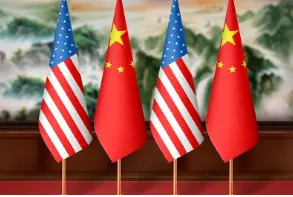American novelist John Shors, 49, has seven novels under his belt, and all of them are set in Asia.
His latest novel Unbound is a love story that takes place on the Great Wall.
Unbound is based on an ancient Chinese folk tale about Lady Meng Jiang.
Shors fleshed out the original story with fictional side characters and subplots.
While the folk tale ends with the tragic deaths of Meng and her husband Fan Xiliang, Shors concluded his version on an upbeat note.
Christine Branstad, the wife of the US ambassador to China, Terry Branstad, has read Unbound and recommended it to friends and family, both in China and in the United States.
Commenting on the book, she says in an email: "My husband and I have both read it and loved the beauty of the story and that portion of the history of the Great Wall. It is a true gift to be able to share that story with the world."
Speaking about his work at an event at Beijing's Bookworm store on March 14, Shors said: "In the West, there are so many novels written, especially within historical fiction, from a sort of European standpoint. And I think there's an amazing part of the world, Asia, that's really underrepresented in Western literature."
The tall, slim and soft-spoken author backpacked across 10 Asian countries when he was 24. And, in 1999, when he was backpacking again in Asia with his wife Allison, Shors discovered the love story behind India's Taj Mahal that inspired his first novel, Beneath a Marble Sky.
Since then he has written stories set in Vietnam, Thailand, Cambodia and Japan.
Shors has always had a keen interest in the ancient Wonders of the World.
He has written about the Taj Mahal, Cambodia's Ankgor Wat and now China's Great Wall, by which he has been captivated for almost 10 years.
"I wanted to see the Great Wall, I wanted to walk it, I wanted to understand it, and of course, I wanted to write a book about it," says Shors.
To create an accurate portrayal of Chinese culture for the book, Shors spent four months researching before putting pen to paper in 2014, including a two-week trip to Beijing in 2013.
Then, he walked along the Great Wall for almost a week and felt the texture of the bricks, in an effort to imagine spending time on it from the perspectives of his characters in the book.
"My time on the Great Wall allowed me to see its beauty," says Shors.
"This is a graceful, elaborate structure that is far more than a never-ending pile of stacked stones."
Shors admits to his limitations of having to rely on English translations of Chinese historical accounts.
"But I try to get as original source material as possible," says Shors.
Unbound, a novel based on an ancient Chinese folk tale about a woman.
At home in Boulder, Colorado, Shors kept an English translation of Stories to Enlighten the World, a collection of short stories compiled and edited by Feng Menglong during the Ming Dynasty.
During the two-year writing process, he consulted about six experts on Chinese culture and history, including a few from the University of Colorado and one from China.
Referring to Shors' efforts to get the details right, Jeremiah Jenne, a Chinese history teacher at IES Abroad in Beijing, says: "The research John did on material culture is really strong, like some of the descriptions of the clothing, weapons and food."
The book is titled Unbound because its heroine, Meng, has unbound feet and what Shors calls an "unbound spirit".
Women's empowerment is an important subject in the story. As Shors sees it, Chinese women in the Ming Dynasty pushed boundaries in very subtle ways, for instance, in writing good poetry and getting out of home to travel.
So, Shors wanted his heroine Meng to reflect the powerful roles women played in China's history.
"I think there's a concept in the West that historically women in Asia were powerless. I just don't think that's accurate," says Shors.
"I wanted to show women as they truly were, perhaps repressed but yet powerful in their own way."
Women of modern China perpetuate Shors' notion.
For his side business, Shors organizes annual trips for small groups of readers to the Asian settings of his books.
In a 2016 tour to China, five of the six tour guides in Shors' group of 10, were female.
"They were super strong. If I had a problem, I would just say, please fix this problem, and they would fix it," says Shors, smacking the back of his hand on his other palm.
Meanwhile, Shors is looking for opportunities for Unbound to be published in China.
And he doesn't expect there to be more criticism coming from Chinese readers than from other parts of the world.
"I think they'll understand that as an American, I've done my best," says Shors.
"The vast majority of the book is historically and culturally accurate."
Speaking about the book, Huang Jiakun, Shors' agent in China, says: "He has probably set an example for Chinese writers on how to tell China stories."
Huang, who also worked with Shors when the Chinese version of his fourth book The Wishing Trees was published in China in 2011, says she considers Unbound a "faithful, interesting and innovative approach" to Chinese traditional folk tales that will appeal to readers beyond China.
(CHINA.ORG.CN)
 简体中文
简体中文





















